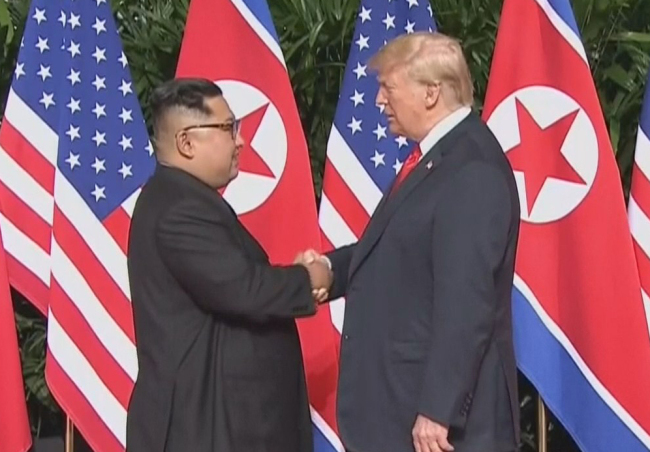North Korean leader Kim Jong-un has expressed a willingness to hold a third summit with US President Donald Trump, urging Washington to come up with a "fair" and "mutually acceptable" deal, state media reported Saturday.
Kim also said his relations with Trump remain excellent and that he will wait until the end of the year for the US to make a courageous decision as he delivered a speech on the second day of a session of the 14th Supreme People's Assembly on Friday, according to the Korean Central News Agency.
 |
North Korean leader Kim Jong-un (left) shakes hands with US President Donald Trump (right) at the US-North Korea summit held in Singapore in June 2018. (Yonhap) |
"If the US proposes holding a third North Korea-US summit with a right attitude and a right method, we have a wiliness to do it one more time," Kim was quoted as saying.
"I will not hesitate in signing an agreement only if it is written in a way that meets the interests of the DPRK and the US, and is fair, mutually acceptable, and this will entirely depend upon with what attitude and calculus the US would come up with,"
he said, using the abbreviation of the North's official name, the Democratic People's Republic of Korea.
Kim said that the North would not stick to summits with the US for the sake of easing sanctions but it will wait with patience until year's end for a courageous decision from the U.S, setting an effective deadline for a shift in the US demands in denuclearization talks.
The remark means that the North cannot accept Washington's so-called "big deal" proposal that calls for dismantling all of its nuclear, missile and other weapons programs before any rewards, such as sanctions relief, are given to Pyongyang.
Kim and Trump met for the first time last June in Singapore and agreed to complete denuclearization of the Korean Peninsula in exchange for Washington's security guarantees. Denuclearization talks, however, have been stalled since the breakdown of their second summit in Hanoi late February.
The Hanoi summit fell apart as they failed to find common ground over how to match Pyongyang's denuclearization steps with Washington's sanctions relief.
Pyongyang wanted major sanctions relief in exchange for dismantling its Yongbyon nuclear facility. But Washington insisted on what officials described as "a big deal" under which sanctions relief would be traded for the dismantlement of all of the North's nuclear and other weapons programs.
Kim said the summit created "strong doubt" over whether the steps that he has taken were right and whether the US has a genuine intention to improve bilateral ties with the North.
"The US came up to the negotiation venue focusing only on methods that can never be realized," he said. "It was not ready to sit face-to-face and solve problems. Neither did it have smart directions or methods."
"We regard it as important to solve problems through dialogue and negotiations but we do not like and have interest in the US way of talks. ... We do not welcome nor have any desire to see another Hanoi summit," he added.
Despite the deadlocked negotiations, Kim said his relations with Trump remain excellent.
"As President Trump has repeatedly mentioned, personal relations between me and President Trump are not as hostile as relations between the two countries, and we still maintain excellent relations and can exchange letters whenever we would like to," Kim said.
Kim's speech came a day after Trump said during his summit with South Korean President Moon Jae-in that he is open to a third summit with the North Korean leader.
Trump, however, signaled no marked change in his stance on sanctions relief until the North's complete denuclearization, though he didn't shut out the possibility of smaller deals with Pyongyang.
During the summit with Trump, South Korean President Moon expressed hope for his fourth summit with Kim, apparently to bridge the gap between the US and the North and help get their stalled talks started gain.
South Korea has called for easing sanctions on North Korea by lifting restrictions on suspended cross-border projects, believing that they could incentivize the North to return to the negotiating table.
Full-blown inter-Korean cooperation, however, has been constrained as Seoul faces objections from Washington, which seeks to maintain the global sanctions regime against Pyongyang at a time when little progress has been made in denuclearization talks.
The North Korean leader said that he is committed to improving inter-Korean relations but urged Seoul to stop trying to play a "broker" or "facilitator" role in denuclearization talks, calling for a more active attitude by voicing its own opinions in improving inter-Korean relations. (Yonhap)





![[Herald Interview] 'Trump will use tariffs as first line of defense for American manufacturing'](http://res.heraldm.com/phpwas/restmb_idxmake.php?idx=644&simg=/content/image/2024/11/26/20241126050017_0.jpg)

![[Exclusive] Hyundai Mobis eyes closer ties with BYD](http://res.heraldm.com/phpwas/restmb_idxmake.php?idx=644&simg=/content/image/2024/11/25/20241125050044_0.jpg)
![[Herald Review] 'Gangnam B-Side' combines social realism with masterful suspense, performance](http://res.heraldm.com/phpwas/restmb_idxmake.php?idx=644&simg=/content/image/2024/11/25/20241125050072_0.jpg)